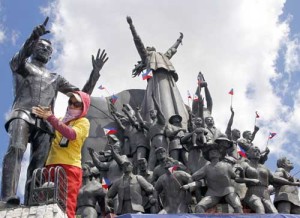THIRTY years after the People Power revolt, the country has not fared better but the ideas and struggles that led to the first EDSA revolution are still alive, a respected political analyst said on Tuesday.
Bobby Tuazon, director for policy studies of the Center for People Empowerment in Governance (CenPEG), on Tuesday noted that the EDSA revolt only led to the replacement of the Marcos regime by other factions of the political elite led by the Aquino family.
“The spirit of EDSA and that of the struggle before it went to waste because of the inability of the succeeding administrations to address the reform calls in a significant way so that poverty, joblessness, landlessness and other social and economic maladies have either remained the same since martial law or have worsened,” Tuazon explained.
He said the peaceful revolt that occurred in February 1986 should be viewed as the culmination of a political event mounted by the people after years of struggle against a dictatorship.
“The struggle called for an end to martial rule, meaningful political and economic reforms, an end to elite rule, as well as justice to victims of human rights violations,” Tuazon added.
According to him, the spirit of EDSA can still be felt in the resilience of civil society organizations and other grassroot groups in pushing for reforms that 30 years of various presidencies failed to address.
Five presidents succeeded Ferdinand Marcos who was ousted in 1986 -- Corazon Aquino, Fidel Ramos, Joseph Estrada, Gloria Macapagal-Arroyo and Benigno Aquino 3rd.
Tuazon noted that even if the country continues to face problems on poverty, Edsa should not be forgotten.
He said the Filipino youth can learn from the uprising and they should be aware that whatever democratic space they now enjoy was made possible by the thousands of martyrs who gave up their lives and careers in the name of democracy, referring to the victims of martial law.
“The youth along with the rest of the nation should keep the torch of EDSA burning until democracy is fully attained and a brighter future is opened that would make human sacrifices a thing of the past,” Tuazon added.
On Thursday, the country will commemorate the 30th anniversary of EDSA People Power.
This year’s celebration will be attended by President Benigno Aquino 3rd, foreign diplomats, some EDSA heroes and people from all walks of life.
“The celebration will pay tribute to the heroes who have sacrificed their lives for the country’s freedom and democracy,” National Capital Region (Metro Manila) Police Office chief Joel Pagdilao said.
Government workers, members of civil society, military and police personnel will reenact the “salubungan” (converging) at the People Power Monument.
WITH RITCHIE A. HORARIO


